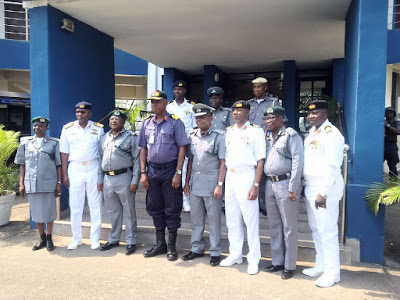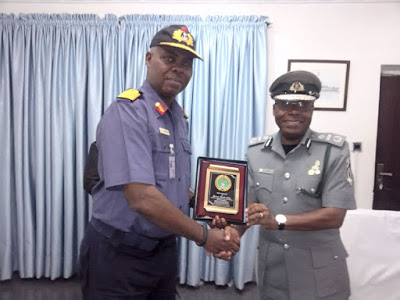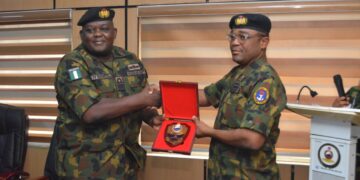 |
| FOC, Western Naval Command, Rear Admiral Onyekwere Osondo and ACG Zone A’ of Customs, Eporwei Edike(both in middle) with their principal officers at the visit of the ACG to the FOC |
The Nigeria
Customs Service(NCS) on Tuesday sought for closer collaboration with the
Nigerian Navy to enable it fight smuggling activities on the coastal waters to block
more areas of revenue loss.
Customs Service(NCS) on Tuesday sought for closer collaboration with the
Nigerian Navy to enable it fight smuggling activities on the coastal waters to block
more areas of revenue loss.
 |
| ACG Epowei Edike presenting a gift to the FOC, Western Naval Command, Rear Admiral Onyekwere Osondu |
The Assistant
Comptroller-General of Customs in charge of Zone ‘A’, Mr Eporwei Edike, made
the appeal on his courtesy call to the Flag Officer Commanding, Western Naval
Command, Rear Admiral Onyekwere Osondu.
Comptroller-General of Customs in charge of Zone ‘A’, Mr Eporwei Edike, made
the appeal on his courtesy call to the Flag Officer Commanding, Western Naval
Command, Rear Admiral Onyekwere Osondu.
The ACG said
that such revenue losses occurred when vessels engage in Ship to Ship(STS)
transfer of petroleum products mid-stream without calling to the customs ports
where they would pay appropriate duty to government.
that such revenue losses occurred when vessels engage in Ship to Ship(STS)
transfer of petroleum products mid-stream without calling to the customs ports
where they would pay appropriate duty to government.
He said the
zone was not leaving any stone unturned to ensure that it did not fail in its
position of contributing about 75 per cent of the customs annual revenue.
zone was not leaving any stone unturned to ensure that it did not fail in its
position of contributing about 75 per cent of the customs annual revenue.
“Zone ‘A’ is
very crucial as we take charge of 16 Area Commands and contributes over 75 per
cent of revenue to the customs service revenue.
very crucial as we take charge of 16 Area Commands and contributes over 75 per
cent of revenue to the customs service revenue.
“With
dwindling oil revenue, customs is being looked upon, so, we are looking at more
collaboration with sister agencies for better service delivery.
dwindling oil revenue, customs is being looked upon, so, we are looking at more
collaboration with sister agencies for better service delivery.
“We know you
have a role, but we also know that you can assist us more, so we can improve on
revenue collection for government.
have a role, but we also know that you can assist us more, so we can improve on
revenue collection for government.
When you are
out there and you see people doing mid-stream discharge into smaller vessels, frown
at it because every vessel is supposed to come into the customs ports to enable
government get revenue,” Edike said.
out there and you see people doing mid-stream discharge into smaller vessels, frown
at it because every vessel is supposed to come into the customs ports to enable
government get revenue,” Edike said.
He noted that
the customs needed the assistance of the Navy for closer marking of the creeks,
which he said were so many for the marine customs alone to monitor, considering
that water is the main place of operation for the Navy.
the customs needed the assistance of the Navy for closer marking of the creeks,
which he said were so many for the marine customs alone to monitor, considering
that water is the main place of operation for the Navy.
“There are
many creeks in Lagos, which is a big task for customs officers to man, let
alone the ones in Edo, Ondo, Delta, Bayelsa, Rivers, Cross-River states. “You
are always there and you can do a lot to help in checking the diversion of
government revenue.
many creeks in Lagos, which is a big task for customs officers to man, let
alone the ones in Edo, Ondo, Delta, Bayelsa, Rivers, Cross-River states. “You
are always there and you can do a lot to help in checking the diversion of
government revenue.
“Please when
you see them, don’t leave them, bring them so we can apply the law because it
is smuggling. Smuggling involves also evasion of duty payment.”
you see them, don’t leave them, bring them so we can apply the law because it
is smuggling. Smuggling involves also evasion of duty payment.”
He thanked
the FOC, for the assistance offered by his men to the customs marine command,
which had recently helped in arresting smugglers of marijuana in 48 jumbo bails
being transported in boats.
the FOC, for the assistance offered by his men to the customs marine command,
which had recently helped in arresting smugglers of marijuana in 48 jumbo bails
being transported in boats.
He also
appreciated the navy for its presence in Tongeji Island, a place very close to
Port Novo in Benin Republic, which if left unattended could serve as haven for
smuggling activities.
appreciated the navy for its presence in Tongeji Island, a place very close to
Port Novo in Benin Republic, which if left unattended could serve as haven for
smuggling activities.
He said the
customs had improved on it efficiency of checkpoints to the land border along
the Lagos- Badagry expressway, which caused smugglers to resort to the creeks.
customs had improved on it efficiency of checkpoints to the land border along
the Lagos- Badagry expressway, which caused smugglers to resort to the creeks.
He promised
that with collaboration with the navy, the creeks would also be an uneasy place
for smugglers.
that with collaboration with the navy, the creeks would also be an uneasy place
for smugglers.
Responding,
the FOC, Western Naval Command said the Navy’s mandate to support the customs
was a national assignment that navy did with dedication .
the FOC, Western Naval Command said the Navy’s mandate to support the customs
was a national assignment that navy did with dedication .
He assured
the ACG of the progress being made with respect to its surveillance system to tackle crime and
criminality on the Nigerian waters.
the ACG of the progress being made with respect to its surveillance system to tackle crime and
criminality on the Nigerian waters.
“We have set
up a surveillance system and I monitor and see up to Togo , Cote d’
Ivoire, every ship that comes into our
waters, but my interest is on our borders with Benin Republic.
up a surveillance system and I monitor and see up to Togo , Cote d’
Ivoire, every ship that comes into our
waters, but my interest is on our borders with Benin Republic.
“STS is not
allowed and any time we see any two ships like that I detail my men there and
in most cases we detain them at the anchorage and such people are brought here
to explain their activities.
allowed and any time we see any two ships like that I detail my men there and
in most cases we detain them at the anchorage and such people are brought here
to explain their activities.
“If there is
going to be an STS, it must be approved and monitored, in which case it is only
petroleum products and nothing more.
going to be an STS, it must be approved and monitored, in which case it is only
petroleum products and nothing more.
“We are not just assisting the customs, it is
our national call. We are like broomsticks. No single broomstick cannot sweep
clean unless you gather them together. That is what we call synergy,” the FOC
said.
our national call. We are like broomsticks. No single broomstick cannot sweep
clean unless you gather them together. That is what we call synergy,” the FOC
said.
He assured that
the navy would hand over all arrests made to the customs service after
appropriate documentation, since the navy does not have a right to prosecute.
the navy would hand over all arrests made to the customs service after
appropriate documentation, since the navy does not have a right to prosecute.
“We don’t
have prosecuting rights, but whenever we arrest, we handover to the customs or
any other appropriate government authority after the necessary documentation
has been done.
have prosecuting rights, but whenever we arrest, we handover to the customs or
any other appropriate government authority after the necessary documentation
has been done.
“We do all we
can to stop sabotage in our waters, but it requires intelligence. That is where
have need to collaborate for information as this will help us do the job. We
will also not hesitate to send you information needed to get your job done.”
can to stop sabotage in our waters, but it requires intelligence. That is where
have need to collaborate for information as this will help us do the job. We
will also not hesitate to send you information needed to get your job done.”
The Rear
Admiral asserted that the navy had the capability of tracking down anything on
the Nigerian waters, adding that its newly-introduced choke-point strategy, and
houseboats stationed at entrances to creeks, had made it very uneasy for
smugglers as a number of the over 3000 creek entrances had been blocked.
Admiral asserted that the navy had the capability of tracking down anything on
the Nigerian waters, adding that its newly-introduced choke-point strategy, and
houseboats stationed at entrances to creeks, had made it very uneasy for
smugglers as a number of the over 3000 creek entrances had been blocked.
He also said
that the navy had made efforts in encouraging some shipper groups who came to
ascertain the safety of the West African waters and the Gulf of Guinea areas.
that the navy had made efforts in encouraging some shipper groups who came to
ascertain the safety of the West African waters and the Gulf of Guinea areas.
He said that
recently, the surveillance system made it possible for the navy to rescue a vessel and its crew and arrested the
hijackers because they were able to track the vessels outside of Nigerian
waters.
recently, the surveillance system made it possible for the navy to rescue a vessel and its crew and arrested the
hijackers because they were able to track the vessels outside of Nigerian
waters.
On the issue
of Tongeji Island, Osondu said about 100 navy personnel had been sent there to
have a government presence in the place, which he said is very close to Port
Novo and could be a veritable place for smuggling activity if there was no
presence of security agencies there.
of Tongeji Island, Osondu said about 100 navy personnel had been sent there to
have a government presence in the place, which he said is very close to Port
Novo and could be a veritable place for smuggling activity if there was no
presence of security agencies there.
He added that
if properly put to use, Tongeji would be a commercial hub for the nation’s
economic benefit.
if properly put to use, Tongeji would be a commercial hub for the nation’s
economic benefit.
Osondu pledged continued support for the Nigeria
Customs Service to protect the waters and fight against all activities likely
to sabotage efforts for government revenue collection.
Customs Service to protect the waters and fight against all activities likely
to sabotage efforts for government revenue collection.
































































